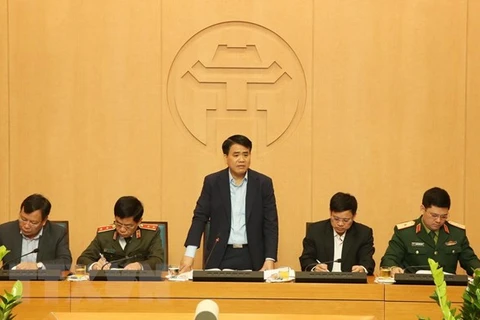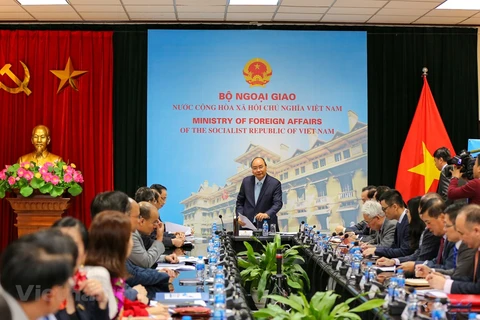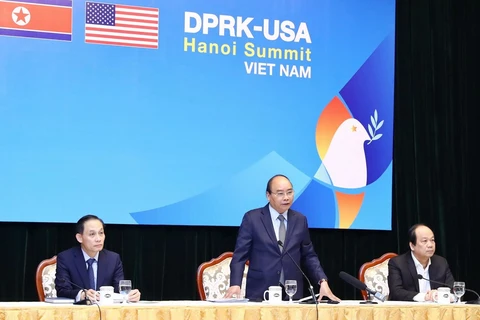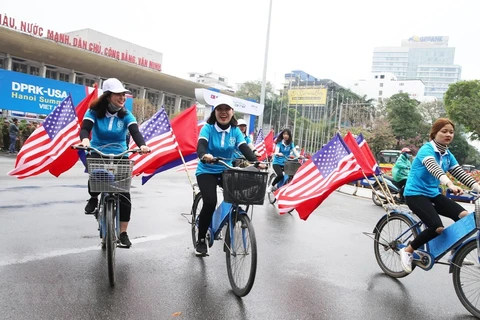
Hanoi (VNA) - “Vietnam’s being chosen as the host of the US-DPRK Summit shows that the world highly values the country,” Dr. Le Dinh Tinh said.
The second summit between the United States and the Democratic People’s Republic of Korea took place in Vietnam from February 26-28. Deputy Prime Minister and Foreign Minister Pham Binh Minh affirmed that it was a leading diplomatic event for Vietnam in 2019.
On the occasion, reporters of the Vietnam Plus e-newspaper had a talk with Dr. Le Dinh Tinh, deputy head of the Institute for Strategic Studies under the Diplomatic Academy of Vietnam, on the role and position of Vietnam within this important summit.
- What do you think are the reasons for the selection of Vietnam to host the second US-DPRK Summit – an international event of great significance?
Dr. Le Dinh Tinh: There are many different ways to assess this, but I think there are four main reasons to explain the US and the DPRK’s choice of Vietnam as the host of their second summit.
Firstly, Vietnam is a destination known for its safety and security. The country also has experience in organising many large-scale and complicated international events such as the APEC Summit 2017 and the World Economic Forum on ASEAN 2018.
Secondly, Vietnam is one of the few countries that have positive relations with both the US and the DPRK. Since the normalisation of bilateral ties with the US in 1995, the relationship has developed both intensively and extensively, especially after the comprehensive partnership was established in 2013. Meanwhile, Vietnam and the DPRK hold a time-honoured friendship which has been maintained since they set up their diplomatic ties.
Thirdly, Vietnam’s stance on the nuclear issue on the Korean Peninsula is shared and accepted by the international community. The stance supports the use of dialogue and peaceful measures, as well as non-nuclearisation on the Korean Peninsula.
Last but not least, from the international community and media’s point of view, Vietnam is considered a good example in two aspects that both the US and the DPRK want to share with the international community. The first aspect is its experience in transforming relationships from former enemies to partners, and from partners to substantive cooperative partners. The second is its experience as a reformed, open and integrated nation which has practical, friendly relations with other countries, giving priority to economic development while maintaining political stability, and ensuring a peaceful security environment to serve development.

- How about the role and position of Vietnam in the second US-DPRK Summit?
Dr. Le Dinh Tinh: The primary role and position of Vietnam in this summit is as host; to provide a place for the meeting; and offer support in terms of logistics, security, and reception.
The second role, more indirectly, is that through the selection of the place and asking for the support from Vietnam, both the US and the DPRK want to convey a message about the importance of the use of dialogue, openness, and making the impossible possible. Vietnam itself tells the story of a country that can overcome the impossible, change its status with others from former enemies to partners, and transform from a low- to middle-income country. It is now an attractive destination for tourists and investors, and holds an increasing position in the region and the world.
The third role is that with its role as the host of summit, as well as its policy and particular line of approach, Vietnam is considered a factor for building peace on the Korean Peninsula, although the US and the DPRK have direct negotiations with each other. Once again, Vietnam has its name put down on the world’s diplomatic mediation map.
- As a venue for an important international diplomatic event, what do you think about the position and role of Vietnam in the international arena?
Dr. Le Dinh Tinh: Vietnam’s being chosen as the host of the summit shows that the international community highly values the role of Vietnam – which has not only taken the initiative to open its door to the world, but also actively contributes to the world’s affairs. Last year, Vietnam sent a level-2 field hospital to South Sudan following its commitment to peace-keeping with the United Nations.
Not stopping at the organisation of international events, there will be higher expectations for Vietnam when the country assumes the role as ASEAN Chair in 2020 and possibly as a non-permanent member of the UN Security Council in the 2020-2021 tenure.
With its role as the host of the summit and a constructive method of approach, Vietnam will receive higher respect from other countries in the region and the world and their governments in addressing regional issues, especially complicated ones such as the nuclear matter on the Korean Peninsula.
Vietnam’s organisation of this summit helps convey a message on its external policy of consistently supporting the settlement of regional and international conflicts by peaceful means, such as dialogue and mediation. As a result, Vietnam will play a bigger role in the regional peace and reconciliation process. This is also a way of implementing Directive No.25 of the Party Central Committee’s Secretariat on elevating multilateral diplomacy, including reconciliation diplomacy.
The event demonstrates that Vietnam has gained the stature of a middle power in terms of diplomacy. Criteria for a middle power in the diplomatic aspect are that the nation supports multilateral solutions to international disputes and conflicts, supports rule-based international order, and actively serves as a bridge between powerful countries and smaller ones.
Thank you!./.























